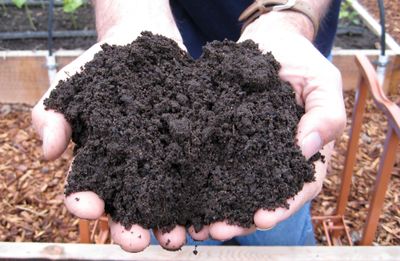Healthy soil essential for productive garden

It is the very foundation of our gardens and its fertility is absolutely critical to growing healthy, productive plants. But it’s something we gardeners often overlook.
I’m speaking, of course, about soil.
While visiting organic gardener Dave Swett in Deer Park last summer, I was impressed by the size and vigor of his vegetable plants. Swett’s emphasis on the importance of soil fertility has convinced me to make it my primary focus for all future gardens.
Why is it so important? Put simply, if you don’t replenish your soil with the nutrients your plants took up last year, this year’s garden will be full of weak, unproductive plants that are susceptible to insects and disease.
Soil contains all sorts of beneficial bacteria, fungi, protozoa, nematodes and earthworms whose primary purpose is to break down organic matter and make nutrients available for plants. It’s our job to keep those little guys busy so our soil stays healthy.
The first step in soil preparation is working with it at the right time. The easiest way to determine this is by picking up a handful of soil and squeezing it in your palm. If you poke a finger into the ball of soil and it easily breaks apart, the soil is ready to be worked.
If your palm is wet and the ball breaks into large clumps, it’s too soon. Working with wet soil will destroy the soil’s composition, resulting in a garden full of dirt clods with poor moisture retention.
If you set up a compost pile of leaves and garden trimmings last fall, you are on the ball. Dig through it, screen out any materials that didn’t break down and then add the crumbly compost to your garden soil.
If you are starting from scratch, there are many natural soil amendments you can add. I like to lightly rake under shrubs or in flower beds to collect decomposing leaves for the garden.
Other natural amendments include straw – provided it is free of weed seeds – and grass clippings from lawns that haven’t been treated with chemicals.
Garden centers sell organic compost, peat moss and composted animal manures. In recent years, they have started carrying lines of organic products that include bone, blood, kelp and alfalfa meal, each of which provide plants with different types of nutrients.
What’s your soil structure like? If you have sandy or clay soil, the best thing you can do is add natural amendments to it. They will slow down the movement of water through sandy soil and lighten up heavy clay soils so that moisture, air and nutrients move through it more easily.
The soil pH in the Inland Northwest tends to be in the neutral range, which is fine for growing vegetables, so it’s rarely necessary to have your soil tested.
During the growing season, the use of mulches around plants not only keeps moisture in the soil but also impedes the growth of weeds.
The most readily available mulches are untreated grass clippings, layers of newsprint, leaves and weed-free straw. At the end of the season, these mulches can be turned into the soil to decompose and add nutrients.
Another important consideration is choosing an efficient watering method. To conserve water, avoid using overhead sprinklers. Instead, put water at the soil level by using soaker hoses or drip irrigation systems and make sure you’re only watering the rows of plants or raised beds instead of the paths between the rows.
The best time to water is during the early morning hours when less evaporation takes place.
I hope you will join me in taking the pledge to build your soil this year. Our efforts will result in productive gardens because our soil will be able to retain the moisture and nutrients it needs.